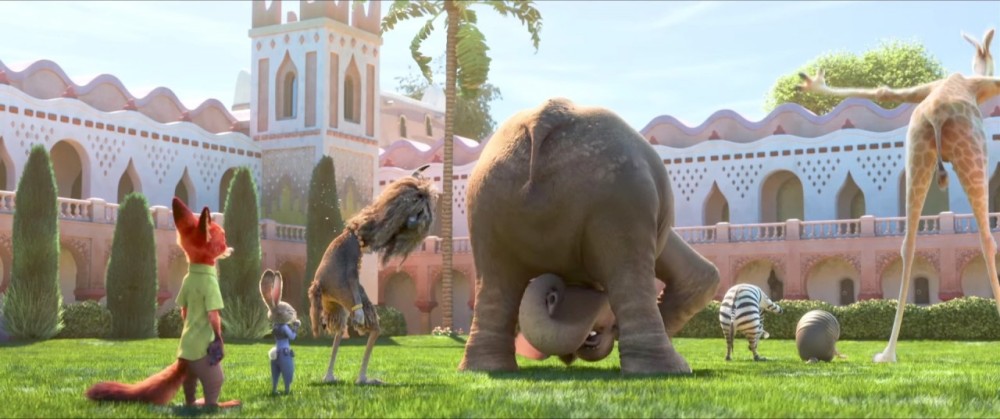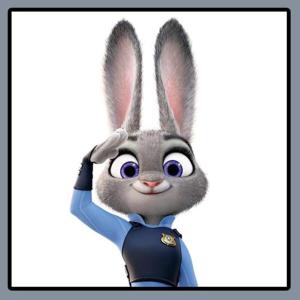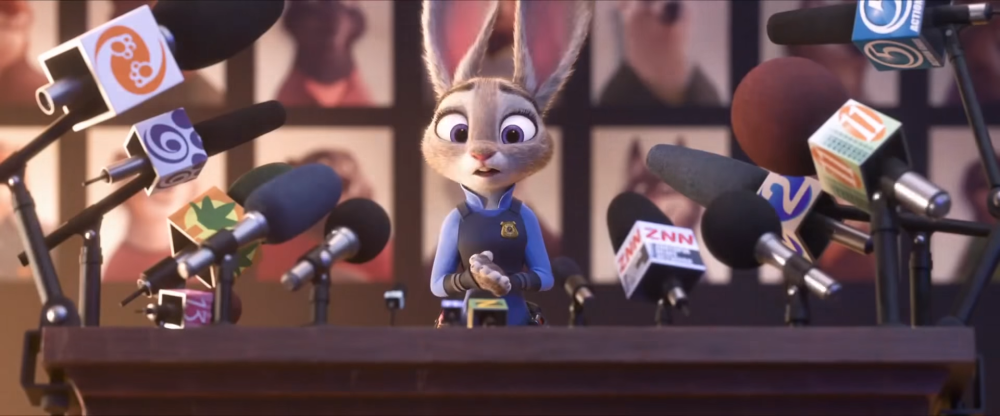First Theatrical Release: February 17, 2016 (limited); March 4, 2016 (general)
First Home Viewing Release: TBD
My Rating: 4/5 stars
Where I Found It: In a theater!
Bechdel Test Score: Passed. Female characters include Judy Hopps, Bonnie Hopps, Gazelle, Dawn Bellweather, Mrs. Otterton, Fru Fru, and a few other incidental characters (this movie has a very large cast). I can remember a couple conversations between female characters that did not revolve around men, the first of which is the conversation between Judy and her mom about her desire to be a cop when she grows up. Later she has work-related conversations with Dawn Bellweather. (There are probably others I am not remembering off the top of my head.)
So, were it not for my vow when I “ended” my Year in Disney Movies project that I would keep this blog up-to-date, I probably would not have gone to see this movie on its last night in the local theater. If my husband’s mother hadn’t happened to be in town that night and wanting to see it, he also would not have gone. All present ended up glad that we went (I’m going to convert him into a Disney fan yet. ;))
This is one of those movies that has as much good stuff for adults as for kids, especially regarding “work culture,” and it also has a few surprisingly dark moments that justified the PG rating (unlike Frozen). Despite that, it is mostly light and fun with timeless messages about being true to yourself, following your dreams, and seeing past stereotypes — and its focus on the character development of Judy and Nick keeps it from feeling bogged down by its large cast of characters (unlike, say, Atlantis).
Similar to Disney’s earlier “talking animal” movies (Lady & the Tramp, The Lion King), in Zootopia animals are used to skirt around topics that would be taboo in a movie about humans. This is most striking in the humorous visit to a nudist park, where Judy and Nick are shocked by naked animals but the movie can still get away with “showing everything,” but it also comes through in the uphill battle Judy faces to be taken seriously in the workplace as the first rabbit on the police force. I’m going to start (and possibly end) there.

Yup, that’s nude yoga.
Also, unlike all the earlier films that I pretty much assumed people had gotten around to seeing, I realize that this one is not yet “common knowledge.” So, consider yourself forewarned that there be spoilers ahead.
Welcome to Being a Woman in the Workplace
 Judy’s sex is never mentioned outright as she goes to work for the ZPD, but it should be noted that along with being the only rabbit on the force, she is also the only female cop we ever see in the movie. And any woman whose ever struck out to chase a career — especially one in a male-dominated field — will recognize the plight of women workers in Judy’s story.
Judy’s sex is never mentioned outright as she goes to work for the ZPD, but it should be noted that along with being the only rabbit on the force, she is also the only female cop we ever see in the movie. And any woman whose ever struck out to chase a career — especially one in a male-dominated field — will recognize the plight of women workers in Judy’s story.
Because of all the preconceptions people have of rabbits in Zootopia (they’re easily frightened, “sweet,” innocuous, “cute,” etc.), Judy has to work twice as hard as every other cop in the movie to be taken seriously. She has to study and train harder to graduate from the academy. Then, despite graduating at the top of her  class, on her first day on the job she plummets from top of her class to the most menial task on the force — she’s assigned as a meter maid. The first time the receptionist sees her, he gushes about how “cute” she is (NOT the way to compliment someone who has worked her butt off to get where she is). The admonishment she gives him rings a bit more true to race than gender relations (it’s OK for one rabbit to call another rabbit cute, but it’s offensive when someone else does it), but the fact that she called him on it at all at least raised the issue of what is and is not appropriate to say in a professional setting.
class, on her first day on the job she plummets from top of her class to the most menial task on the force — she’s assigned as a meter maid. The first time the receptionist sees her, he gushes about how “cute” she is (NOT the way to compliment someone who has worked her butt off to get where she is). The admonishment she gives him rings a bit more true to race than gender relations (it’s OK for one rabbit to call another rabbit cute, but it’s offensive when someone else does it), but the fact that she called him on it at all at least raised the issue of what is and is not appropriate to say in a professional setting.
Then she has to face what is essentially “hazing” from her supervisor, Chief Bogo, who tells her she has to resign if she’s not able to solve a missing animal case within 48 hours — despite the fact that more experienced officers haven’t made any headway in two weeks. Not only that, but because she is a new employee she is shut out of the police department’s computer system and all the resources the other cops have access to, and Bogo doesn’t bother making sure she’s set up before sending her off.
 Honestly, I can feel my stress levels rise just writing about this, because it just smacks of the “Old Boys Clubs” that are still rampant in the workplace, where women may not be shut out of work computer systems, but are instead left behind in the office while “the guys” go out for drinks or take the afternoon off for a round of golf. Being excluded from these outings often puts women on the slow track to promotion, where deals are made over drinks and networks are forged outside the office.
Honestly, I can feel my stress levels rise just writing about this, because it just smacks of the “Old Boys Clubs” that are still rampant in the workplace, where women may not be shut out of work computer systems, but are instead left behind in the office while “the guys” go out for drinks or take the afternoon off for a round of golf. Being excluded from these outings often puts women on the slow track to promotion, where deals are made over drinks and networks are forged outside the office.
Bogo should have been fired for allowing one of his cops to go out on an assignment without the tools she needed to do her job. Heck, Judy should have sued the pants off him. Instead, he’s given a free pass because he has a change of heart after Judy manages to crack the case. Too little, too late, bud — if I were Judy, I’d ask for a transfer to another precinct.
And while Judy’s tenacity in pursuing the case despite the limitations imposed on her is admirable, I was still somewhat uncomfortable that she was essentially willing to “take it” — she went out knowing the odds were stacked against her, and rather than fight for what she deserved so that she could do her job, she accepted that she would be shut out and busted her back for the ZPD, anyway. Make no mistake, this has reverberations for women in the workplace everywhere: many of us KNOW we are being shut out or shut down in various ways, but we’re stuck in that awful double bind: do we go forward crippled in our work by being granted “barely enough,” or do we risk being seen as “whiners” or worse for demanding more? Because let’s not forget that women are seen as “less likable” when they fight for what they need to do their jobs, or for the compensation they deserve, whereas men who do the same are just performing to expectation. Where does this leave women? Either accepting less than they know they deserve, or being labeled as “difficult” and risking their long-term prospects at a company. (Although it’s never mentioned, I’d bet anything that Judy’s paycheck is substantially smaller than the other rookies’.)
So, I can’t really fault Judy for the choice she made to just “make it work” — but I do worry a little about the message it might send to girls who end up facing similar “raw deals” in the workplace.
Eventually, Judy makes a huge personal and professional blunder just as she is beginning to get the respect and recognition she deserves. That mistake is taking the “easy way out” and promoting the idea that the animals in town that have gone “feral” (i.e., giving in to their “wild” natures and attacking others) did so because they were all “predators.” (In the world set up in Zootopia, predator and prey have cohabited peacefully for years.) This alienates Judy from Nick, a fox who has become her unofficial partner on the case.

She has to make amends with him, and this is where things get a little squicky for me. A few times before this point, people have discredited Judy by referring to her as a “dumb bunny” — notably, the same insult that is often used to discredit women, particularly young or attractive women. Now, as Judy is owning up to her wrongs, she sums it up by crying, “I’m just a dumb bunny, all right?”
 This is apparently just what Nick wanted to hear. He caught it on tape, and he plays it back to her. They are reconciled.
This is apparently just what Nick wanted to hear. He caught it on tape, and he plays it back to her. They are reconciled.
So, yeah, in case you missed it: when you are a woman in the workplace and you have a falling out with your male friend/co-worker, the best way to smooth things over is to embrace the worst thing people are saying about you. Once you’ve been sufficiently taken down a few notches, you’re welcome at the table again.
But It’s Really a Smart Commentary on Racial Profiling, Etc.
With that said, I’m willing to forgive this blunder because this movie really is a very intelligent and timely allegory for racial profiling, as well as the hidden evil of “majority rules.” (Zootopia is 90 percent “prey,” 10 percent “predator.”) Just because you are in the majority does not mean you are entitled to make all the rules/persecute the minority, and man, the sooner we can drum that idea into kids’ heads, the better. Also, the fact that Hanna Rosin recommended the movie on the feminist podcast I listen to also confirms that feminist Disney fans need feel little guilt for enjoying this latest offering.

Just one point: there’s another female cop : the elephant wich have her birthday is called “Francine”.
LikeLike
Ah, thanks — I must have missed that.
LikeLike